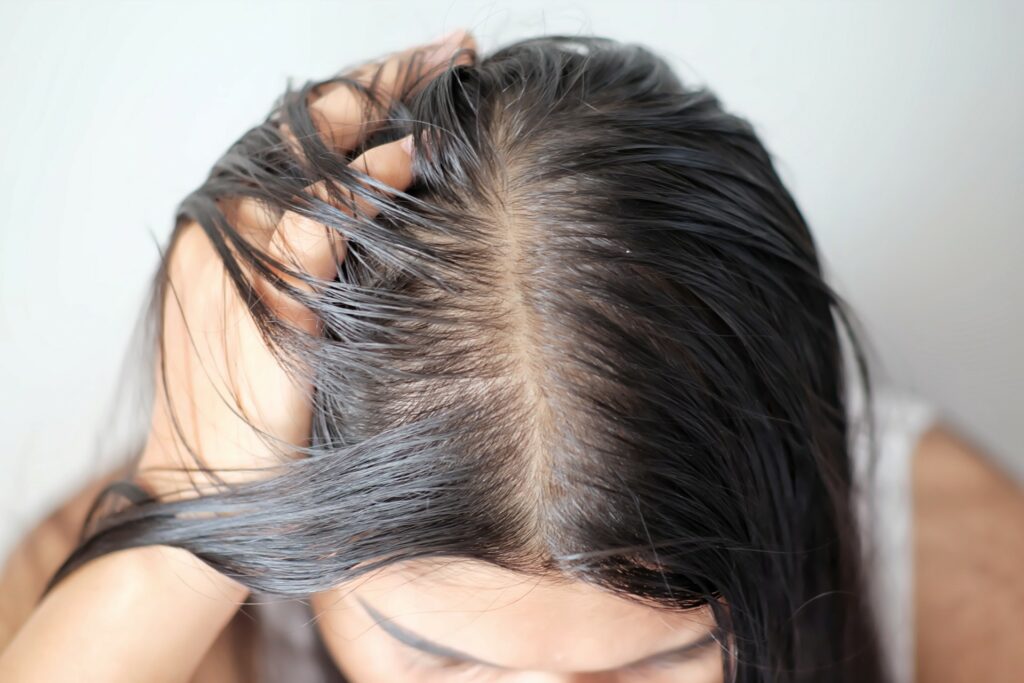Oily Hair and Its Impact on Skin’s Appearance

It is no mystery that hairdressers and dermatologists tell most people that daily washing of hair can strip hair of its natural oils and leave hair looking dry and brittle. However, even if you skip a day, a few days, or a week, the oilier the hair becomes, the more it can negatively impact the condition of the face and the skin. Oily hair can negatively impact skin because the sebum glands in the scalp are creating excess oils necessary for skin health, but not beneficial in abundance. The oil on the scalp, even if left alone, will work its way onto the face and can clog pores. Clogged pores result in bacteria forming and spreading, which leads to acne, breakouts, and an unattractive appearance of the skin.
Sebum is good for hair and skin, but in excess, it can be a challenge to address once it is in full swing. Overactive sebum causes greasy hair and sometimes dandruff. These conditions can take time to get back into control, so addressing concerns early with a qualified dermatologist can avoid these unnecessary and avoidable breakouts before they become problematic. At a minimum, following a few key tips can help manage oily hair and skin to prevent it from becoming something that causes breakouts.
It is highly recommended that hair be dried after washing it. Wet hair collects more dirt from the air, so even a quick blow-dry or using a coverup can help keep extra oils and dirt off the hair and extend the life of your wash.
Oily Skin Management
Unwashed hair that collects excess dirt and oil compacted by overactive sebum glands will cause the skin to become oily, especially on the face. Oily skin is often self-diagnosed, and treatments for oily skin can exacerbate the issues. Here are some basic things anyone can do and should do if they face acne breakouts on the face and an oily scalp.
- Remove the day’s dirt and makeup—even if you are inside most of the day, dirt collects!
- Never go to sleep with makeup on
- Choose oil-free products that are non-comedogenic
- Use mild and gentle cleansers
- Avoid alcohol-based cleansers
- Apply moisturizers after washing; even oily skin needs some moisture, so it doesn’t over-react
- Always wear sunscreen
- Use blotting papers to remove excess oil during the day
- Avoid touching your hands to your face during the day
Basically, oily skin gets much of the same treatment as other skin types. The skin should be cleansed regularly, followed with moisturizer and sunscreen daily. Hair and skin are directly connected to each other, so keeping hair clean will reduce the risk of oil and dirt spreading to the forehead and the rest of the face. However, dermatologists caution people not to over-wash and over-clean hair and skin. The opposite effect of overcleaning is over-active glands that produce excess oil, leading to appearance and other skin problems.
Can Diet Affect Oiliness of Hair and Skin?
If you have visited a skilled and knowledgeable dermatologist about oily hair and skin, they should have asked about your lifestyle and diet choices. It is now well-known that what you put in your mouth can impact your skin’s health. High-sugar foods, processed foods, and refined carbs can cause skin to be oilier. Many people suffer from dairy allergies that directly affect their skin’s health, but they rarely know it is a contributing factor. Milk, ice cream, chocolate, yogurts, and other dairy products have been shown to produce more sebum, which means oilier skin and hair. Pizza and fried foods also may contribute to oily skin. However, keep in mind that most things in moderation are not the root cause of oily skin. Some people have oily skin types, and those who want relief can seek topicals from their local dermatologist.
Balanced diets can improve many skin concerns, so simply add a few more fruits and vegetables and choose whole grains. Also, drinking plenty of water can help improve the skin’s appearance. Lack of hydration can trigger the skin to produce more sebum, so keeping the body hydrated can help with this!
If you have other concerns or have done these steps and still don’t have the skin you want, contact a local and reputable dermatologist. Buckhead Dermatology offers excellent bedside manners, affordable pricing, and expertise in hair, face, and skincare. A professional dermatologist will offer her clients easy to make changes to help with oily hair and skin, but also be able to provide alternative treatments if necessary. You do not have to deal with oily hair and skin alone, so contact Buckhead Dermatology today for an appointment.
Buckhead Dermatology is in Atlanta, and Dr. Sherrie Straughn is accepting new clients!
